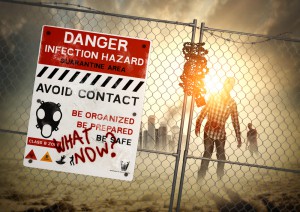 When was the last time you faced adversity?
When was the last time you faced adversity?
Hopefully, your office won’t be swarmed by a herd of reanimated corpses any time soon, but you and your team’s ability to face and survive adversity, from upset clients to industry melt-downs, is probably the single biggest influencer of your business’ on-going success.
AMC’s “The Walking Dead” is highly educational for us entrepreneurs. It’s brimmed with wonderful metaphors for business and demonstrates stellar and pitiful leadership through adversity by both Rick Grimes and Philip “The Governor” Blake. Spoiler alert!
A quick guide to the analogy:
Zombies = your adversity
Nomadic group of survivors = your team
Survival of the apocalypse = beating the odds
Here are some broad leadership tips from The Walking Dead:
-
Stake the Claim of Leader Early On
The only chance of continuing your existence lies in your ability to hold your group together. In a time of need, people will be more willing to follow a brave, accountable leader but you need to publicly assume the mantle. Both Rick and The Governor appointed themselves as leaders of their groups from the very beginning of the crisis, and you should too.
-
Keep Your People Calm
Rick heavily underestimated how much the presence of fear would reduce the group’s odds. Living in perpetual fear robs people of their sensibilities and is as contagious as the zombie virus. Environmental conditions play a big factor – Rick made a poor choice by camping at Hershel’s farm. Rick’s entourage were skittish at best, divisive and murderous at worst even before the farm was overrun by zombies. By the time of the final attack, the group was destined to have massive casualties.
On the other side of the spectrum, The Governor created a safe environment in Woodbury early on, hosting cook-outs and social occasions including zombie fighting to get people’s minds out of panic mode. Their clear headspace allowed calm development of survival strategies including supply raids and better fortification. The contrast in the quality of life between the two groups is stark and the only difference lay in their perception of safety.
-
Learn From Mistakes Quickly
In the above example, Rick fortunately adapted from his mistakes and made a much better place of safety at the prison. Notice how messy argument levels dropped dramatically since then? You’re in the deep end and you’re going to make mistakes. So is your team. Survivors are agile – forgiving and learning from the errors quickly can be the difference between survival and demise.
-
Establish a Code of Honor
You must standardize the way the collective thinks, feels and acts under duress, which a Code of Honour does. Rick parried off into farm country with a caravan of strangers from diverse backgrounds whom he might not have normally chosen to associate with. I assume you don’t employ convicts and wife-beaters, but do realize that you have a relatively mixed bunch of people with different belief systems playing survival by completely different rules. These differences are amplified in the presence of fear.
Rick haphazardly tried to enforce his own code on other people, but they never established one together. For example, Rick was completely against killing or sacrificing living civilians to survive but Shane, and later on Carl, did so willingly. Lead a group in absence of a Code of Honour long enough and your own people will turn on you just like brainthirsty zombies.
-
Discuss Democratically, Decide Autocratically
If your people get eaten by zombies, that’s on you, so ultimately the course of action should be on you too. Rick didn’t neglect the importance of buy-in nor the creative value that could come from open problem solving discussions – however he often got bogged down in survival situations by trying to be too accommodating. The Governor made good bold decisions, which instilled confidence in others, but was totally dismissive about anyone else’s opinions. Find a balance between the two.
-
Overcommunicate
You’re waist-deep in problem solving, but it is likely that your furious single-mindedness is distracting you from your responsibility to communicate to your group. Both Rick and The Governor understood that people would give in to their own growing insecurities by default if not reassured – so communicated plans and status frequently and publicly.
Can you think of any other good or bad leadership examples from the Walking Dead?
Ulrico Grech-Cumbo is the co-founder and MD of Ambrosia Agency, a disruptive experiential marketing agency. Having qualified with a BSc. in Mechanical Engineering, Ulrico developed a passion for connecting problems to solutions and explores that passion through the multi-faceted world of entrepreneurship.
Image Credit: Shutterstock.com



